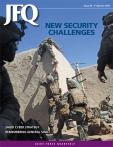JFQ 64 (1th Quarter, January 2012)
01 ôåâðàëÿ 2012
 This issue focuses on the new security challenges
This issue focuses on the new security challenges
Social conditions, political limitations, and other sources of moral «friction» all serve to temper war’s violence. Via such practical constraints, real wars—wars as they must actually be fought and strategized—are won.
This practical understanding of war’s moral-political qualities stemmed from Clausewitz’s deep appreciation for the role of human nature in war. Continental philosophy acted as a lens through which he understood his and others’ experiences. Enmeshed in philosophy, perhaps reluctantly, his muse was Platonic (the concept of the human psyche—pathos, logos, and ethos—from Plato’s Phaedrus serves as Clausewitz’s centerpiece, the “paradoxical” or “wonderful” trinity). Clausewitz echoes Plato’s Socrates, who was also a soldier, and one whose Peloponnesian War experience shaped his approach to politics and morality… Peter D. Fromm, Douglas A. Pryer, and Kevin R. Cutright. War Is a Moral Force: Designing a More Viable Strategy for the Information Age
Âåðíóòüñÿ íàçàä